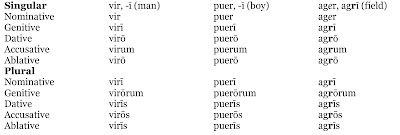In viā ambulō. Hīc est casa
pulchra. Fenestra casae est aperta et in fenestrā est rosa pulchra. lānua casae
nōn est clausa. Iānua quoque est aperta et hīc est fēmina benigna. Vidēsne virum?
Fēmina cum virō ambulat. Cum fēminā vir rosās spectat. Vir in
casā nōn habitat sed casam et rosās cūrat. Vir rosās ostendit. Femina benigna
est et virō grātiās agit. Rosae sunt grātae fēminae et rosās laudat. Vir
in casā parvā in silvā habitat et vir quoque rosās habet. Vir rosās amat. Ibi
est casa virī. Ibi sunt rosae virī. Bene rosās cūrat et clārae sunt
rosae virī.
Schola puellōrum
puellārumque prope silvam est. Schola nostra est clāra et fāma est magna.
Interdum iānua est aperta. Rosās vidēmus. Agrōs quoque vidēmus. Silvam
ex fenestrīs vidēmus. Ibi est via longa. Ex fenestrīs viam quoque vidēmus.
Nunc magistra nostra discipulōs
exspectat. In scholā nōn labōrāmus. In viīs ambulāmus. Ad scholam properāmus. Vidēsne
puerōs? Hī puerī linguam Latinam discunt, sed hae puellae sunt
parvae et linguam Latīnam non discunt. Magistra nostra est benigna et puerīs
et puellīs cāra. Linguam Latīnam discere cupimus. Interdum mātrēs nostrae ad
scholam properant. Mātrēs nostrae magistram vident et laudant. Nōs quoque
magistram laudāmus.
Nunc fenestrās claudimus. Iānua
scholae est clausa et ibi nōn labōrāmus. Ex scholā ad casās nostrās properāmus.
In agrīs sunt agricolae. Ibi labōrant. Mātrēs nostrae nōs exspectant.
Cēnam parant. Aquam portāmus et mātrēs sunt laetae. Rosās cūrāmus et spectāmus.
Frātrēs parvōs cūrāmus. Hoc est grātum frātribus nostrīs.
Nunc agricolae ex agrīs properant. Cena est parāta et cēna est grāta agricolīs. Fīliī agricolārum ex agrīs cum patribus properant quod hī quoque cum agricolīs in agrīs labōrant.
Find the Latin:
Singular
[1] Nominative
The man looks at the roses
[2] Genitive
There is the house of the man [= man’s house]
[3] Dative
The woman is grateful to the man. [= thanks
the man].
[4] Accusative
Do you see the man?
[5] Ablative
The woman is walking with the man.
Plural
[1] Nominative
These boys are learning Latin.
[2] Genitive
The boys’ school [= the school of the boys]
[3] Dative
Our teacher is dear to the boys.
[4] Accusative
Do you see the boys?
We also see the fields.
[5] Ablative
There are farmers in the fields.
(They) hurry out of the fields.
The nouns puer (boy), vir (man) and ager
(field) are all second declension nouns even though they don’t end in -us. They
take exactly the same endings but note that some of them ending in -er, lose
the /e/ before the endings are added. No vocative is listed since the
nominative and vocative are the same.

